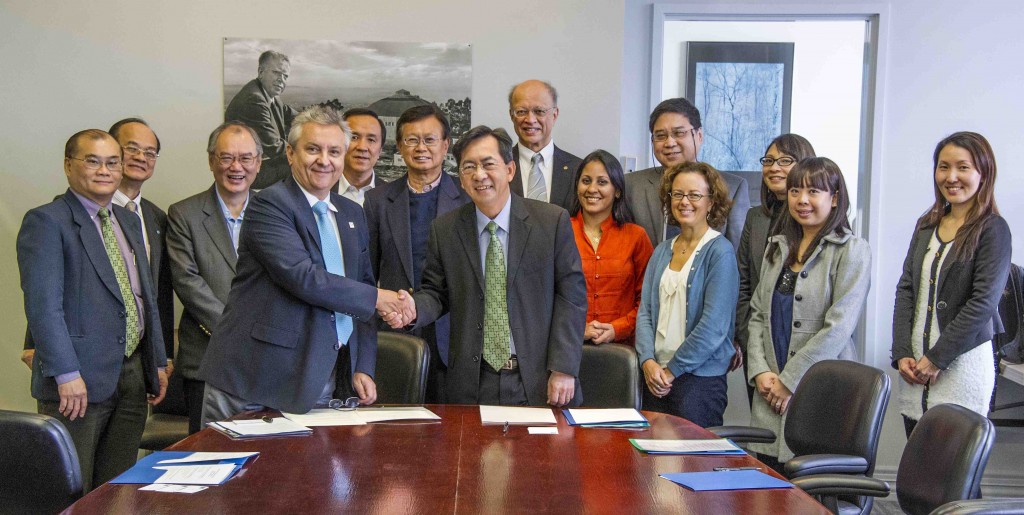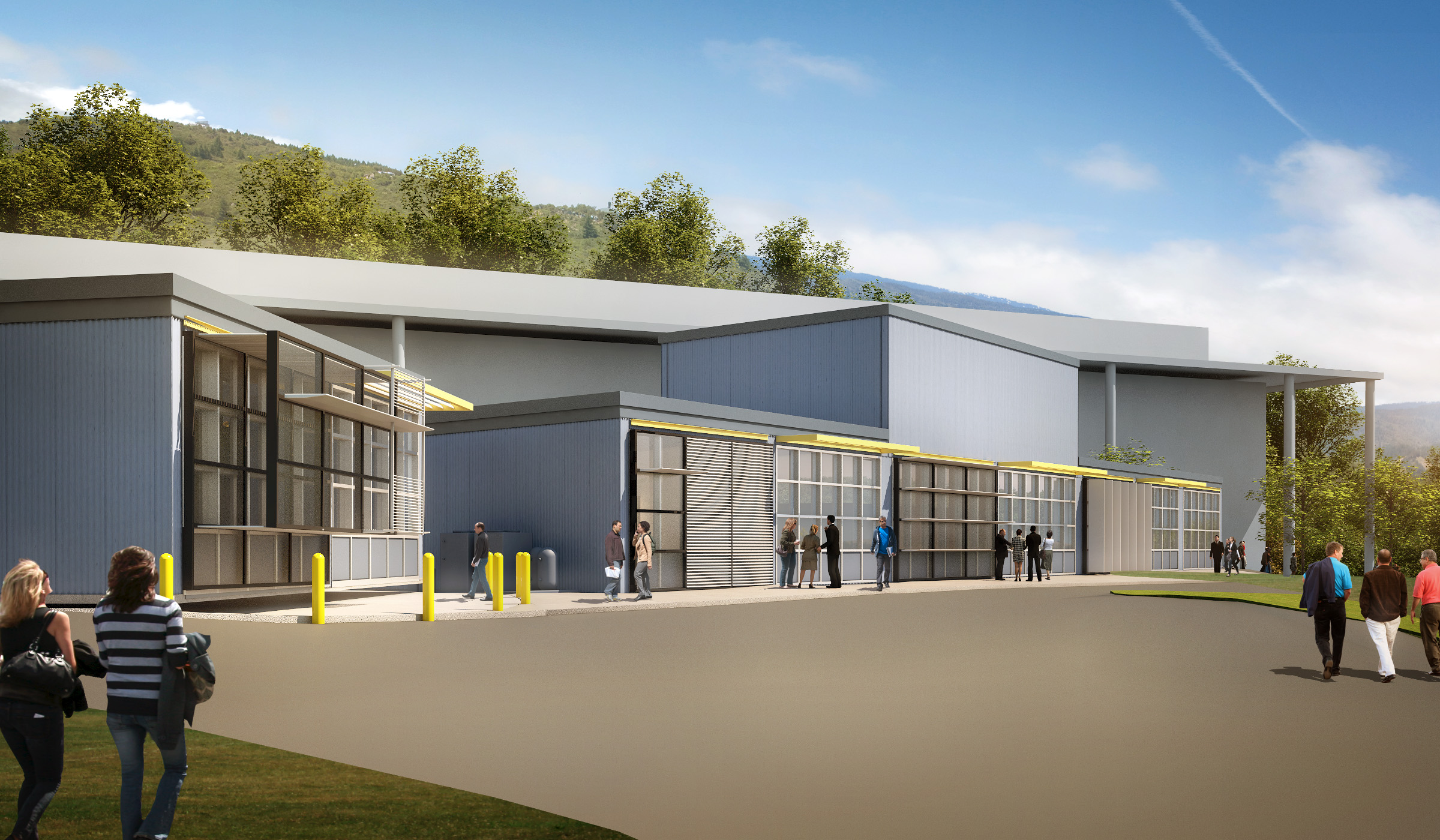The U.S. Department of Energy’s Lawrence Berkeley National Laboratory (Berkeley Lab), a world leader in technologies for energy-efficient buildings, has agreed to work with Singapore as that island nation pursues energy conservation and climate mitigation policies.
Specifically, Singapore is looking to Berkeley Lab’s FLEXLAB as it endeavors to build its own facility for testing building technologies. Like a life-size set of building blocks, FLEXLAB (Facility for Low Energy Experiments in Buildings), the first of its kind in both size and scope, will allow researchers and manufacturers to test building systems and components under “real-world” conditions by swapping out systems and changing configurations and then conducting rigorous monitoring of performance of every key building element that impacts energy consumption and building performance.

Horst Simon, Berkeley Lab Deputy Director, and Dr. John Keung, CEO of Singapore's Building Construction Authority, sign an MOU to collaborate on advanced building technologies. (Photo by Roy Kaltschmidt/Berkeley Lab)
On Nov. 16, 2012, Berkeley Lab Deputy Director Horst Simon signed a Memorandum of Understanding with the head of Singapore’s Building and Construction Authority (BCA), whose mandate covers the development of the built environment in Singapore, establishing a framework for collaborative projects in a number of areas related to building technologies.
“Berkeley Lab’s building research team has been leading the way for decades in developing technologies to improve building performance and achieve huge energy savings,” said Ashok Gadgil, director of Berkeley Lab’s Environmental Energy Technologies Division (EETD). “We are excited about the opportunity to exchange concepts and expertise with those pursuing similar goals around the world.”
Construction of FLEXLAB, a project of EETD, begins this fall and is scheduled to be completed in 2013. Buildings account for about 40 percent of the nation’s greenhouse gas emissions and 70 percent of U.S. electricity consumption; advanced building technologies offer the potential for dramatic energy savings—up to 80 percent for new construction and 60 percent for retrofits.
“As we look towards technologies to push green buildings towards higher energy efficiency, this partnership and knowledge exchange will bring adaptable green building solutions faster into the marketplace for different climates,” said John Keung, CEO of the Building and Construction Authority, who led a Singapore delegation at the signing ceremony.
Because Singapore is heavily dependent on its neighbors for energy and other resources, the government has adopted energy efficiency as a key strategy to meet its energy needs while reducing carbon emissions and combating climate change. Berkeley Lab is currently collaborating with Nanyang Technological University in Singapore on several projects, including green data centers and high-performance lab buildings.
Emissions from the building sector in Singapore are expected to rise as demand for commercial space increases. Because Singapore is in an equatorial climate, dehumidification, ventilation and cooling consume enormous amounts of energy. “Plus, the bright tropical sun contributes to greater heat gain through the windows and skin of the building compared to other climates,” said Reshma Singh, a program manager at EETD. “So BCA’s goal is to enhance collaboration with Berkeley Lab scientists in order to accelerate Singapore’s strategies for developing new building materials, technologies, and processes for lower energy consumption.”

An artist's rendering of the FLEXLAB.
FLEXLAB will allow researchers, manufacturers, architects, engineers and others to test and monitor just about any building component or combination of building systems, such as ventilation, lighting, walls, windows, shading and more. It will be located at Berkeley Lab’s main site in the Berkeley hills.
BCA, an agency under the Ministry of National Development, decided to build a test facility like FLEXLAB and will be looking to Berkeley Lab for guidance in a number of areas, including design and construction, data acquisition and collaborative research projects. Since space is at a premium in Singapore, BCA has plans to build its test facility as a rotating test bed on the roof of a new building.
“Our goal is to help BCA with a FLEXLAB-like platform aimed at accelerating breakthroughs in high-performance building envelopes, advanced cooling and air distribution systems, next-generation lighting and whole system integration through smart sensing and controls,” Singh said. Additionally, working with BCA will be a valuable opportunity for bi-directional learning for Berkeley Lab scientists. “To get this type of experience in different climate types and with collaborative R&D is way of growth for them,” she said.
Ultimately, FLEXLAB may be envisioned as a way of going beyond our domestic shores to bridge research across many countries. “Something we’re thinking about for the future is a program across nations through innovative partnership models,” Gadgil said. “There are exciting opportunities to share data from diverse climatic, construction and cultural scenarios and create a data-driven R&D strategy for high-performance buildings of the future. Such solutions have been created in one-off individual projects in various countries, but to proactively address it as a cohesive whole would be a radical departure.”
# # #
Lawrence Berkeley National Laboratory addresses the world’s most urgent scientific challenges by advancing sustainable energy, protecting human health, creating new materials, and revealing the origin and fate of the universe. Founded in 1931, Berkeley Lab’s scientific expertise has been recognized with 13 Nobel prizes. The University of California manages Berkeley Lab for the U.S. Department of Energy’s Office of Science. For more, visit www.lbl.gov.